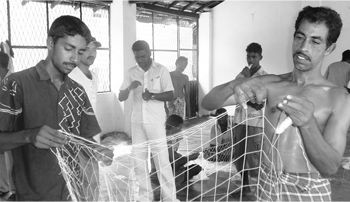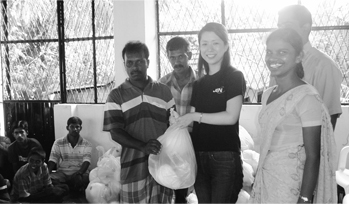Japan's Official Development Assistance White Paper 2007
Column 10 Rehabilitation Support for Tsunami Disaster Victims in Sri Lanka
— Psychosocial Care for People through Group Work —
The Major Earthquake off the Coast of Sumatra and Tsunami in the Indian Ocean of December 26, 2004 caused unprecedented damage, resulting in 1.2 million affected and more than 200,000 dead or missing. Once such a disaster strikes, the affected people often lose not only their families and assets but also their will to keep living their lives. Soon after the Tsunami, JEN, an NGO, started its emergency operation in the Hambantota District* in southern Sri Lanka, one of the regions that suffered greatly, with the implementation of a Non-food Item Distribution project. Furthermore, thinking that subsequent life reconstruction assistance including psychosocial care was important, it started a new project in April 2005 using Grant Assistance for Japanese NGO Projects to help adults and children to regain their positive attitude towards life. In this project, with the cooperation of local social workers and psychologists, training activities in fishing net making, coconut rope making and vegetable gardening were conducted for adults for livelihoods rehabilitation. For children, opportunity for sports and other game activities were provided. So far, a total of more than 2,000 people have participated in the project.
Ai Tanaka, the head of the office, was shocked by the depressed look of the participants on the first day of four-week fishing net making training. "Everyone looked so down. Especially, many of the men felt uncomfortable showing their grief and vulnerability to others, and they were not willing to speak up." However, beginning around the second week, participants gradually started to speak to each other while working together on fishing net making. They changed to be able to expel their pains and sadness caused by the Tsunami, instead of keeping their experience of the Tsunami in their heart and recalling it repeatedly. Work such as fishing net making and vegetable gardening is not merely vocational training, but rather provides an opportunity for the affected people to share and understand their loss as well as encourage each other by joining the same group work. We also considered responding carefully to the victims in counseling groups or to individuals with the cooperation of social workers and psychologists.
One of the participants in the fishing net making training is Bonipas, who lost his wife and daughter in the Tsunami, along with the boat he purchased with a loan. Bonipas began to step out of his house, encouraged by this work. While talking with other participants during the work, he began to confess to social workers his worries about raising his children by himself. Bonipas gradually regained his spirit, and became the leader of the local supporting group established by the participants in the community.
Tanaka notes that, "I was once asked, 'Don't give me a training session, but a fishing net.' It was really difficult to make everyone understand the significance of our activities." However, on the day of the closing ceremony, everyone said with bright smiles, "At first, I thought training was useless, but now I am happy that I joined," and "I felt better again." Such impact of psychosocial care is also shown as a quantitative outcome; percentage of the Post-traumatic Stress Disorder (PTSD) was reduced from 73% to 22.5% in the entire project region. Furthermore, after the Tsunami the catch from fishing was reduced to 279.8kg — almost half of the amount before the Tsunami. However, after the training this figure increased by 16% to 325.5kg per month, steadily increasing their income.
NGOs can really provide such considerate assistance that could reach every heart of each affected person. This role of NGOs is becoming more and more important in the realm of international cooperation.

Participants in the fishing net making activity. Smiles are back on their faces

Tanaka (center) passing material for a fishing net to Bonipas (left).
The woman on the right is a local social worker (Photo: JEN)


 Next Page
Next Page